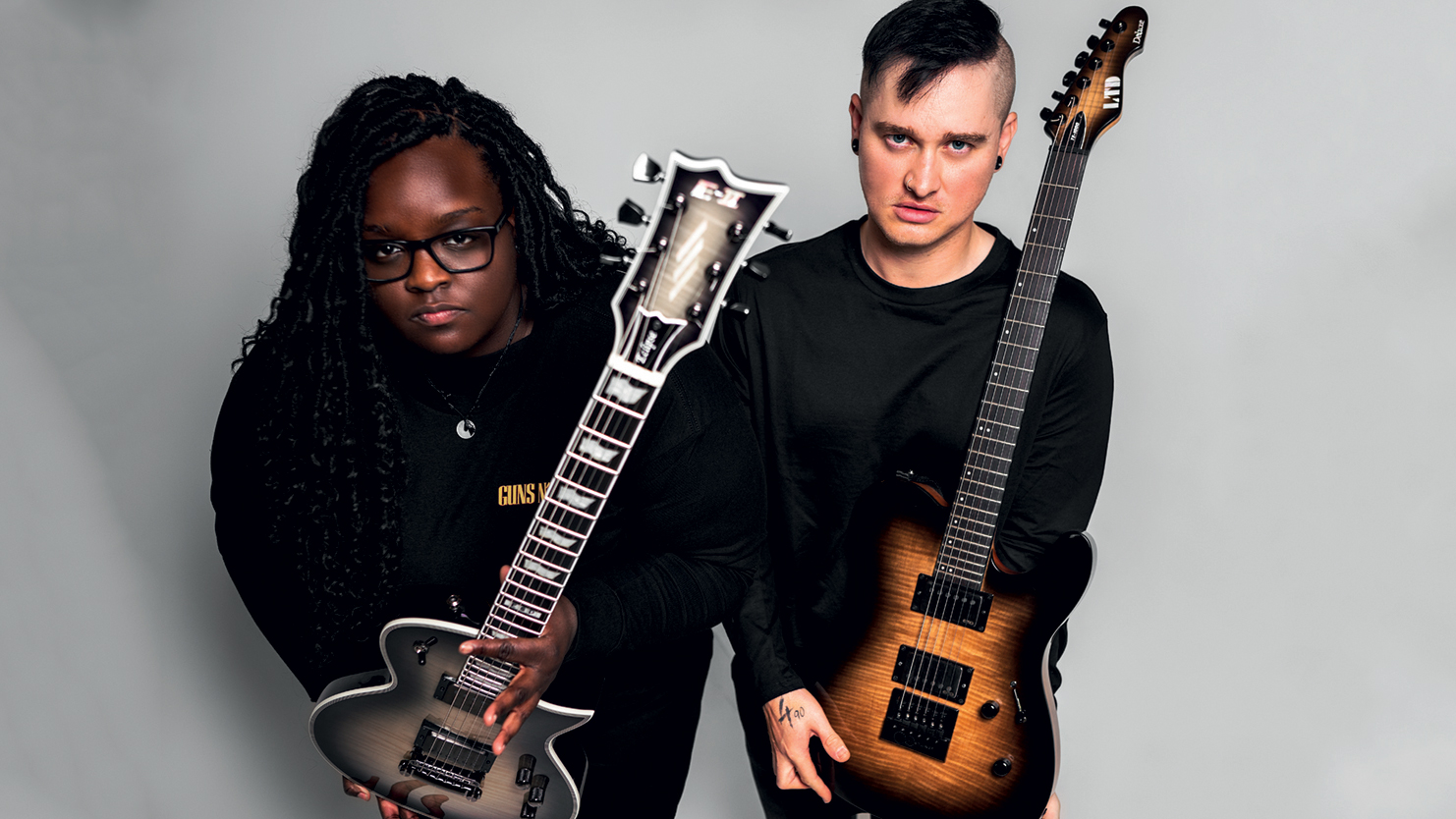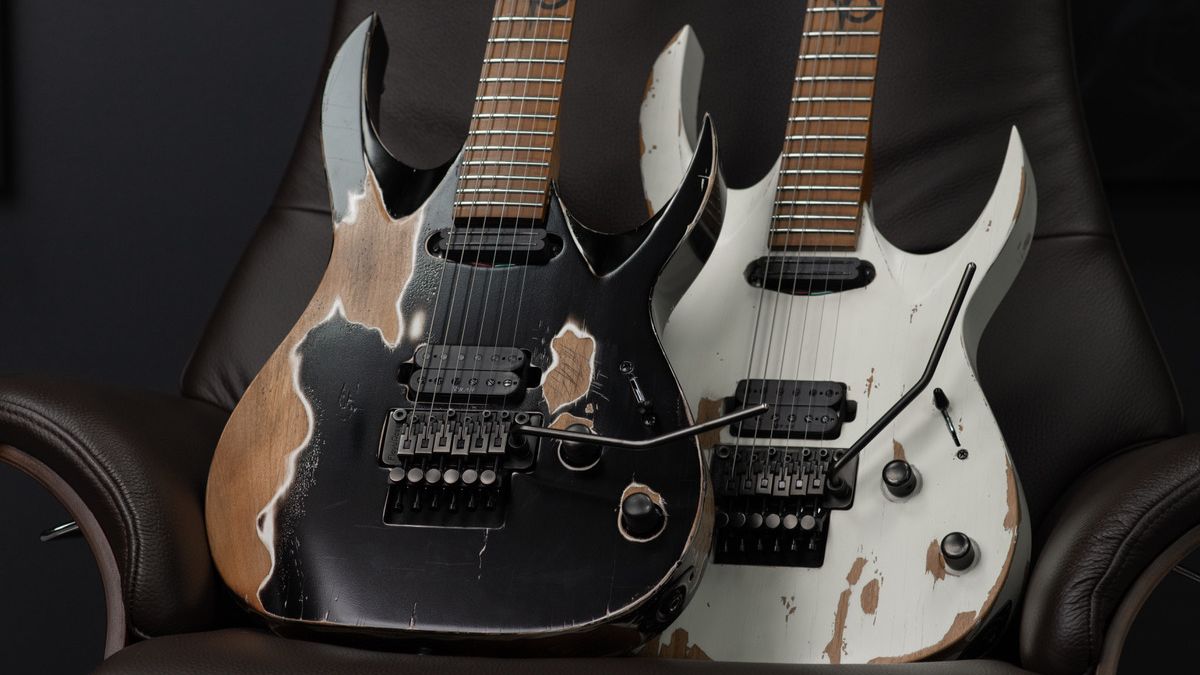Tetrarch’s Diamond Rowe and Josh Fore on building a second wave of nu-metal with freak tones, high-gain amps and songs you can relate to
Tetrarch's new album, Unstable, is a vital and life-affirming throwback to the golden era of nu-metal

They say that those who forget history are doomed to repeat it. But what if the history in question was awesome? It was just a quarter-century ago that angsty 20-somethings in tracksuits, creatively dyed hair and enough eyebrow piercings to install a zipper onto ruled not just the rock charts, but the pop charts.
Korn’s Jonathan Davis was on MTV’s Total Request Live. Staind albums sold millions of copies. Things were so crazy that even a band like Trapt could be taken seriously. For what might’ve been the last time, heavy metal ruled the airwaves.
And then, just as quickly as they came into the spotlight, the nu-metal bands were out in the cold. A select few, like Linkin Park and Slipknot, adapted. Others, too numerous to name, became punchlines.
But movements, from bell bottom jeans to disco to even the fluorescent nightmare that was the '80s, have a way of coming back. Tetrarch remembers those heady days of angsty metal climbing the charts all too well.
We want to write songs that connect with people, that are heavy and you can bang your head to it but you can also sing along to it and you can relate to it
Diamond Rowe
“When we were growing up, our favorite bands were from that era. The Disturbeds and Linkin Parks and Slipknots and Korns were bands that could be very heavy but also very melodically driven. Their fans could sing along with the songs but still be in the pits. That resonates with me a lot,” says lead guitarist Diamond Rowe.
“We’re never going to be the heaviest band in the room. We’re never going to be the softest band in the room. But we want to write songs that connect with people, that are heavy and you can bang your head to it but you can also sing along to it and you can relate to it.”
Armed with ESP guitars and Unstable, their brand-new second album, the Atlanta-bred foursome are doing their part to bring the hallmarks of nu-metal – chunky, drop-D verses, lead guitar lines doused in a heavy layer of effects, choruses so sharply catchy they could cut your life into pieces – back to the forefront of rock.
All the latest guitar news, interviews, lessons, reviews, deals and more, direct to your inbox!
If the world is ready for that once familiar-sound to get invented, you have to give credit to Rowe and her co-guitarist/lead singer Josh Fore for being ahead of the curve.
Tetrarch have been at this for a while – the band have been together since high school and put out their first EP way back in 2013. For almost a decade, they’ve been building up their songwriting chops, working on their live shows and building a fanbase through the tried-and-true method of non-stop touring. The crazy thing is, up until now, they’ve been doing it all themselves. Freak, Tetrarch’s 2018 debut album, was self-released.
For Unstable, they’re ready to take that success to the next level with the power of
a new label, the hard rock powerhouse Napalm Records, behind them. Not that they’re ready to give up their hard-earned independence. The new album was recorded in February 2020, before their deal was signed, so Unstable is fully their baby.
“We definitely had a lot of labels coming after us and we’re very picky in wanting to find a partner that saw the same vision as us and put as much effort as we were going to put in,” Fore says. Given the timing of Unstable’s release on what is hopefully the tail end of the COVID-19 pandemic, it seems to be a fortuitous partnership.
The road, where Tetrarch thrives, is still not an option for promoting the new album. Yet the band is optimistic about the future. Despite the extra downtime, they’re still hard at work, writing new material and working on plans to shoot as many music videos as they can.
“This past year, a lot of bands were struggling because they couldn’t be on the road. And for us, it’s insane, we probably had the biggest year as a band that we’ve ever had,” Rowe says.
There was a reason nu-metal had so much commercial success in its day: the genre’s biggest hits had hooks for days. Tetrarch have learned that lesson well: they eschew blast beats, preferring syncopated rhythms that flirt with being downright funky. Rowe’s lead work is focused more on melody and atmosphere than on show-off-y virtuoticism.
Their continued success in the face of a globally catastrophic situation could be chalked up to the fact that their songs are just damn catchy. Fore can sound as pissed off as anybody on a verse, but he knows how to make an anthemic chorus absolutely soar, too.
The nu-metal formula Tetrarch are so inspired by is essentially classic metal with a twist, so it makes sense that the same goes for the band’s gear. On Unstable, both Rowe and Fore have taken to using EVH amps (EL34 for her, 5153 for him).
“I love something that’s, like, super-high gain,” says Rowe. “I’m just a gain junkie, I love my gain, but not to compensate for not being a good player, and finding an amp that can do that but has a ton of clarity as well was awesome to find.”
While Fore prefers a more minimalist approach to his rig (“Tube Screamer, amp, cab, noise suppressor, I’m good to go,” he says), Rowe dabbles more frequently in the effects realm, though her pedalboard has yet to reach the NASA control room level of some of her role models from the early 2000s.
“There’s one effect people hear all the time; it’s on our song Freak, so we call it the Freak Tone. It’s kind of a similar version to what Head uses a lot in Korn. I use a Univibe, a chorus, a delay and an overdrive. I use that effect all over the place and the Whammy… you’d think I just discovered the Whammy this year, I have so many Whammy parts on this new record,” Rowe laughs.
When talking about Tetrarch’s ascending place in the metal world, there’s an elephant in the room that needs to be discussed: the fact is, Rowe is one of the few Black women holding down a spot in a genre that may be slowly diversifying, but is still predominantly male and white.
Articles about her tend to have headlines like “Meet Diamond Rowe, the guitarist repping Black women in metal”. To attribute the success of Rowe’s band to her race and gender would be an insult to her skills as a musician and to the band as a whole. Tetrarch have put in their time. And yet to deny that image and novelty play a role in marketing a band would be plain silly.
“It’s something that brings attention to my band that maybe people who wouldn’t usually pay attention, do pay attention,” Rowe says.
“And every band has to have something different about them to turn heads in the beginning sometimes, and I just look at it as like a blessing in disguise. And I’m very humbled. I didn’t set out with that goal in mind, but I’m more than happy to take the lead on it.”
Whether she asked for it or not, to be turned into that kind of a figurehead, especially in an age where politics has infiltrated all aspects of culture, is a huge ask, but Rowe has managed to keep a level head.
“It sounds like I don’t care, but it’s not that. It’s just that I try not to let any of that cloud my mind because if I do, it can bring a lot of pressure on you and it can give you some anxiety and make you feel like you have the weight of the world on your shoulders,” she says.
It helps that Rowe has bandmates like Fore, who recognize that what makes her unique is her ability to play the absolute shit out of a six-string.
I play guitar. I love heavy music. I love heavy guitar. And that’s the reason I started doing this. And that’s the reason I’ll always do it
Diamond Rowe
“There’s always something about bands that kind of blow up or do bigger, whatever, that there’s always something different, whether it’s musically, whether it’s the attitude of the members,” Fore says.
“It’s something I’ve embraced, and I’ve actually told her over the years to embrace it more. She’s always shied away from the fact that she is so different. She just wants to be known as a guitar player and she has the chops to do that. But I tell her all the time, ‘You’re special, you’re very different.’ And that’s something that’s very cool.”
What makes Rowe special can be heard all over Unstable – the little melody lines and textured runs that harken back to the last golden age of metal, when loud guitars could compete with pop as a cultural force. Bringing gain-filled amps back to radio? Now that would be special.
“I’m honestly just a guitar player,” she says. “I play guitar. I love heavy music. I love heavy guitar. And that’s the reason I started doing this. And that’s the reason I’ll always do it. I’m going non-stop here, man!”
- Unstable is out now via Napalm Records.
Adam is a freelance writer whose work has appeared, aside from Guitar World, in Rolling Stone, Playboy, Esquire and VICE. He spent many years in bands you've never heard of before deciding to leave behind the financial uncertainty of rock'n roll for the lucrative life of journalism. He still finds time to recreate his dreams of stardom in his pop-punk tribute band, Finding Emo.

